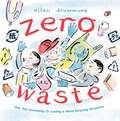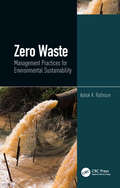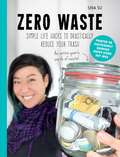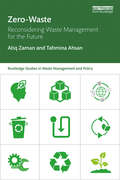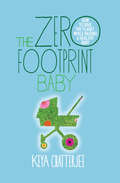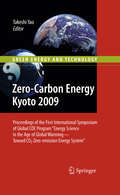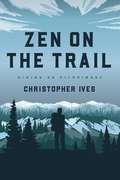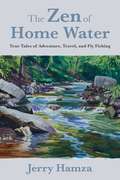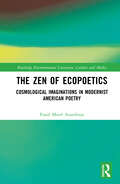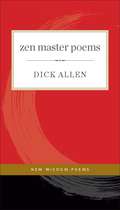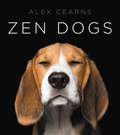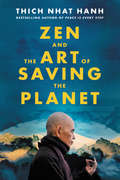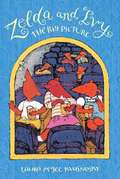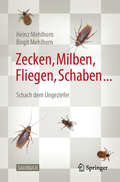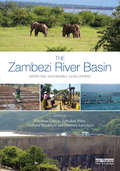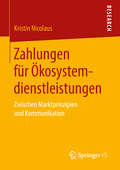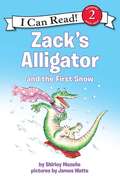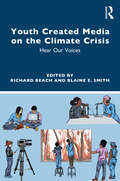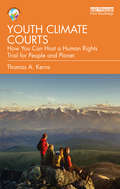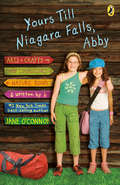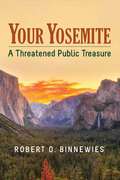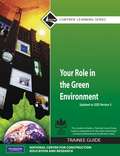- Table View
- List View
Zero Waste: How One Community Is Leading a World Recycling Revolution (Green Power)
by Allan DrummondIn this fifth installment in Allan Drummond’s picture book series about green living, a town in Japan takes a stand against its throwaway past and shows that it really does take a village to make sustainable change.Kamikatsu, Japan is known worldwide for its sanitation innovations. This small community of 1700 people is leading the way in recycling and up-cycling, and as of 2022, had nearly achieved its goal of zero waste. Told in Allan's hallmark narrative style, Zero Waste is the story of a group of citizens who dared to break out of their comfort zone and make radical change for the good of their town and the planet. Through the eyes of two children visiting their grandmother, this inspiring addition to the author’s acclaimed Green Power series about everyday communities inventing exciting new approaches to green living shows that working together for a common cause has an impact that is lasting, meaningful—and fun!
Zero Waste: Management Practices for Environmental Sustainability
by Ashok K. RathoureZero Waste: Management Practices for Environmental Sustainability presents approaches for resource management centered on reducing waste and reusing and recycling materials. It aims to save energy by reducing energy consumption associated with extracting, processing, and transporting raw materials and waste, and also to reduce and eventually eliminate the need for landfills and incinerators. This book presents the various principles, methods, and tools that can be used to address different issues in the areas of industrial waste reduction and sustainability. It examines how to eliminate waste at the source and at all points of a supply chain, and how to shift from the current one-way linear resource model to a sustainable "closed-loop" system. Proposes strategies for businesses to reduce and reuse waste with a goal of reaching a zero waste status. Focuses on how mitigating waste and promoting recycling can save vast amounts of energy. Explains how the zero waste approach would be a key measure to ensure environmental sustainability and help to offset global climate change.
Zero Waste: Simple Life Hacks to Drastically Reduce Your Trash
by Shia SuEasy and Effective Strategies to Jumpstart a Sustainable, Waste-Free Lifestyle We have a worldwide trash epidemic. The average American disposes of 4.4 pounds of garbage per day, and our landfills hold 254 million tons of waste. What if there were a simple—and fun—way for you to make a difference? What if you could take charge of your own waste, reduce your carbon footprint, and make an individual impact on an already fragile environment? A zero waste lifestyle is the answer—and Shia Su is living it. Every single piece of unrecyclable garbage Shia has produced in one year fits into a mason jar—and if it seems overwhelming, it isn’t! In Zero Waste, Shia demystifies and simplifies the zero waste lifestyle for the beginner, sharing practical advice, quick solutions, and tips and tricks that will make trash-free living fun and meaningful. Learn how to: Build your own zero waste kitPrepare real food—the lazy wayMake your own DIY household cleaners and toiletriesBe zero waste even in the bathroom!And more! Be part of the solution! Implement these small changes at your own pace, and restructure your life to one of sustainable living for your community, your health, and the earth that sustains you.
Zero-Waste: Reconsidering Waste Management for the Future (Routledge Studies in Waste Management and Policy)
by Atiq Zaman Tahmina AhsanThis book analyses ‘zero-waste’ (ZW) as an emerging waste management strategy for the future, which considers waste prevention through innovative design and sustainable consumption practices. Drawing on a diverse range of case studies from Australia, Bangladesh, Japan, New Zealand, Sweden, and the USA, this book explores why urban waste management systems still remain a major challenge for almost all cities around the world. Rejecting waste as an ‘end-of-life’ problem, Atiq Zaman and Tahmina Ahsan instead consider waste prevention through the ZW model, in which resources are utilized and consumed with minimum environmental degradation. In addition, the authors give extended discussion on why embracing the ZW concept will be beneficial for the circular economy (CE). Providing a strategic zero-waste framework and an evaluation tool to measure waste management performance aimed towards ZW goals, this book will be of great relevance to students, scholars, and policymakers with an interest in waste management, sustainable consumption, urban planning, and sustainable development.
The Zero Footprint Baby
by Keya ChatterjeeIn our culture, pregnancy, birth, and childrearing are deeply connected to consumption and resource use. From the baby shower to the minivan and the larger apartment or first house, the baby-raising years are the most hyper-consumptive of our lives, and can set a family on an unsustainable track for years to come. The Zero Footprint Baby: How to Save the Planet While Raising a Healthy Baby shows how to raise a child with little to no carbon footprint. The book covers every issue new parents face, including pregnancy (what kind of birth has the lowest impact); what to feed your baby (breastfeed, formula, or both?), childcare (who should take care of the baby, and how?), and of course, diapering. Using a mix of personal anecdotes, summarized research, and clear guidance on how to pursue the most sustainable baby-rearing options, The Zero Footprint Baby is the resource and reference book for all new parents with green inclinations. Keya Chatterjee is the director for international climate policy at the World Wildlife Fund. She previously served as a climate change specialist at the US Agency for International Development, and also worked on communicating climate issues while at NASA. Keya's commentary on climate change policy and sustainability issues has been quoted in numerous media outlets, including USA Today, The New York Times, Fox News, The Associated Press, The Washington Post, and NBC Nightly News. She was also featured in a special issue of Politico on climate change highlighting the "muscle of the movement."
Zero-Carbon Energy Kyoto 2012
by Takeshi YaoThe Global COE is setting out a zero-emission technology roadmap and is promoting socioeconomic studies of energy, studies of new technologies for renewable energies, and research for advanced nuclear energy. It has also established the Global COE Unit for Energy Science Education to support young researchers as they apply their skills and knowledge and a broad international perspective to respond to issues of energy and the environment in our societies. This book follows on the earlier volumes Zero-Carbon Energy Kyoto 2009, 2010, and 2011.
Zen on the Trail: Hiking as Pilgrimage
by Christopher IvesDiscover how hiking can be a kind of spiritual pilgrimage—calming our minds, enhancing our sense of wonder, and deepening our connection to nature.Evoking the writings of Gary Snyder, Bill Bryson, and Cheryl Strayed, Zen on the Trail explores the broad question of how to be outside in a meditative way. By directing our attention to how we hike as opposed to where we’re headed, Ives invites us to shift from ego-driven doing to spirit-filled being, and to explore the vast interconnection of ourselves and the natural world. Through this approach, we can wake up in the woods on nature’s own terms. In erudite and elegant prose, Ives takes us on a journey we will not soon forget. This book features a new prose poem by Gary Snyder.
The Zen of Home Water: True Tales of Adventure, Travel, and Fly Fishing
by Jerry HamzaA Collection of Fishing Stories from Across the Globe, by a Master Storyteller. To the uninitiated, it might be somewhat surprising to discover that fly fishermen tend to be rather contemplative sorts. During those dark nights and long seasons when fishing is not a promising endeavor, we settle down to the next best thing, reading our vast libraries of ancient fishing lore, interspersed with the odd philosophical tome. And when we do, we usually don&’t want to read proverbial stories about &“landing the big one,&” or lengthy how-to expositions on how to catch the aforementioned big one. Rather, we tend to prefer stories that place our beloved piscatorial pastime within the larger context of life and nature. Stories that, as Hamza describes, &“…sparks a light. A light that is both familiar and comforting.&” Such is The Zen of Home Water, the latest angling book by Jerry Hamza. Hamza is a John Volker for the new millennium. His book is interspersed with stories about monster brook trout, beautiful North woods streams and lakes, quirky backwoods guides, and legendary fly hatches. Through it all, he shows us one of the most profound truths of life, that &“It takes the acquisition of wisdom to understand that a happy life is actually a mosaic of small and insignificant events…we string together moments in life—like pearls becoming a beautiful necklace.&” The iridescent pearls that Hamza strings together are many and include the importance of &“freestyling&”, that uncontrollable escape impulse that implores us to drop whatever we are doing and head to the stream, any stream, with fly rod in hand. Another recurring theme is the need to unplug from the modern, electronic world. He instructs us how to trespass (with bartered permission) and fish those waters that look so inviting yet so out of reach to the (usually) law abiding. His recipe for squirrel stew is not jealously guarded but freely shared. And his stories of catching giant brook trout in the Maine North Woods allow the reader, who usually can&’t participate in such acts of angling greatness, to at least know that they are occurring to someone, somewhere. Hamza is a member of that peculiar subset of anglers, the bamboo rod aficionado. While acknowledging the cold, hard fact that bamboo rods are nothing more than conglomerations of &“expensive blades of grass,&” he also realizes that these handmade treasures passed down to us from previous generations will hopefully outlive us (and our car doors) and that we are merely their caretakers for a time. Although the dreaded &“g&” word (i.e., graphite) does make a brief appearance, Hamza is definitely one of those anglers who would rather hold an aged, organic creation of the bamboo rod maker&’s art than the latest admittedly efficient chemical concoction straight from the laboratory. This puts him squarely in the tradition of John Gierach, although Hamza&’s writing is better and his stories more entertaining. Hamza&’s own home waters are dual--Maine&’s Grand Lake Stream area and the southern shore of the Lake Ontario region. There are echoes of Thoreau&’s Maine Woods in his stories of remote lakes and plentiful trout. And while he takes us all around the country when relating his angling exploits (Kerouac&’s On the Road is a particular favorite of his), it is evident that the concept of &“home water&” carries a lot of weight with him. His beloved &“Zen Lake&”, with its less than perfect history and many small fish, could be the home water of any of us.
The Zen of Ecopoetics: Cosmological Imaginations in Modernist American Poetry (Routledge Environmental Literature, Culture and Media)
by Enaiê Mairê AzambujaThis book is the first comprehensive study investigating the cultural affinities and resonances of Zen in early twentieth-century American poetry and its contribution to current definitions of ecopoetics, focusing on four key poets: William Carlos Williams, Marianne Moore, Wallace Stevens, and E.E. Cummings. Bringing together a range of texts and perspectives and using an interdisciplinary approach that draws on Eastern and Western philosophies, including Zen and Taoism, posthumanism and new materialism, this book adds to and extends the field of ecocriticism into new debates. Its broad approach, informed by literary studies, ecocriticism, and religious studies, proposes the expansion of ecopoetics to include the relationship between poetic materiality and spirituality. It develops ‘cosmopoetics’ as a new literary-theoretical concept of the poetic imagination as a contemplative means to achieving a deeper understanding of the human interdependence with the non-human. Addressing the critical gap between materialism and spirituality in modernist American poetry, The Zen of Ecopoetics promotes new forms of awareness and understanding about our relationship with non-human beings and environments. It will be of interest to scholars, researchers, and students in ecocriticism, literary theory, poetry, and religious studies.
Zen Master Poems
by Dick AllenA unique voice in American poetry evocative of Han Shan's Zen verses, Pablo Neruda's Book of Questions, and the writings of Jack Kerouac.What a long conversation we never had! All those rivers? we never crossed together. You so busy with your own life, I so busy with mine. Dick Allen, one of the founders of the Expansive Poetry movement, has won the Robert Frost Prize, the Hart Crane Poetry Prize, and the Pushcart Prize--among others. His work has been anthologized five times in the Best American Poetry volumes, and has appeared in The New Yorker, The Atlantic Monthly, Tricycle, The Buddhist Poetry Review, and The American Poetry Review, as well as numerous other publications. He's a former fellow of the National Endowment for the Arts, and a former Poet Laureate for the state of Connecticut, where he lives and writes.
Zen Dogs
by Alexandra CearnsAward-winning animal photographer Alex Cearns celebrates the peace, calm, and joy dogs bring to our lives with this unique full-color collection capturing eighty dogs in their most relaxed and contented moments.When Alex Cearns caught Suzi the Sharpei on film with eyes closed and an endearing smile on her furry face, the renowned Australian professional pet and wildlife photographer called the picture of serenity "Zen Dog." Captivated by the image's tranquil beauty, Cearns then turned her lens on other canines experiencing their own carefree and meditative "Zen" moments--a series of photos that would go viral across the web and take the top prize in a major international competition.Expanding on Cearns's original web series, Zen Dogs includes eighty stunning color photographs of a variety of breeds--golden retrievers, beagles, French bulldogs, dachshunds, poodles, huskies, pit bulls, and German shepherds. Here are some familiar faces from the online series, joined by dozens of dogs never seen before--all whose engaging personalities shine through. Sprinkled throughout the photos are words of wisdom from the Buddha, Eckhart Tolle, Thich Nhat Hanh, and other meditative masters, inspiring messages that, with the photos, warm the heart and soothe the spirit.A gorgeous compendium for every dog lover, animal enthusiast, and everyone looking to add some peace and joy to their day, Zen Dogs reminds us of the power dogs have to enrich our lives--to make us happier, healthier, calmer, and more loving.
Zen and the Art of Saving the Planet
by Thich Nhat Hanh“When you wake up and you see that the Earth is not just the environment, the Earth is us, you touch the nature of interbeing. And at that moment you can have real communication with the Earth… We have to wake up together. And if we wake up together, then we have a chance. Our way of living our life and planning our future has led us into this situation. And now we need to look deeply to find a way out, not only as individuals, but as a collective, a species.”-- Thich Nhat HanhWe face a potent intersection of crises: ecological destruction, rising inequality, racial injustice, and the lasting impacts of a devastating pandemic. The situation is beyond urgent. To face these challenges, we need to find ways to strengthen our clarity, compassion, and courage to act.Beloved Zen Master Thich Nhat Hanh is blazingly clear: there’s one thing we all have the power to change, which can make all the difference, and that is our mind. Our way of looking, seeing, and thinking determines every choice we make, the everyday actions we take or avoid, how we relate to those we love or oppose, and how we react in a crisis.Mindfulness and the radical insights of Zen meditation can give us the strength and clarity we need to help create a regenerative world in which all life is respected. Filled with Thich Nhat Hanh’s inspiring meditations, Zen stories and experiences from his own activism, as well as commentary from Sister True Dedication, one of his students Zen and the Art of Saving the Planet shows us a new way of seeing and living that can bring healing and harmony to ourselves, our relationships, and the Earth.
Zelda and Ivy: The Big Picture
by Laura Mcgee KvasnoskyIn a fresh and funny new companion to the Theodor Seuss Geisel Award winner, the fox sisters team up with their friend Eugene in three spy-rific adventures. After Zelda, Ivy, and their best friend Eugene watch the new Secret Agent Fox movie (some more bravely than others), they are inspired to do a little detective work themselves. With top-secret agent names chosen and notebook in hand, they're ready to get to the bottom of neighborhood mysteries. But when a rainstorm threatens to ruin the agents' campout, can the three foxy friends come up with an undercover alternative? Sly humor, lively illustrations, and a genuine eye for the everyday dynamics among siblings make this a perfect choice for beginning readers, whether old fans or new. From the Hardcover edition.
Zecken, Milben, Fliegen, Schaben ...: Schach dem Ungeziefer
by Heinz Mehlhorn Birgit MehlhornDieser bewährte Retter vor Ungeziefer hat schon unzähligen Lesern geholfen, sich von den ungebetenen Gästen wieder zu befreien. Mit dem farbigen, anschaulichen Ratgeber erhalten Sie alle Informationen, um Schädlinge zu erkennen und erfolgreich zu bekämpfen und Stich- oder Bißwunden gezielt zu behandeln. Das praktische Glossar zum Nachschlagen ist eine schnelle Orientierungshilfe.
Zebras (Nature's Children)
by Bill IvyHow many kinds of Zebras are there? How fast can a zebra run? Why does a zebra have stripes? Find the answers to these questions and more in this book about the physical characteristics, behavior, distribution, and life of zebras.
The Zambezi River Basin: Water and sustainable development (Earthscan Series on Major River Basins of the World)
by Jonathan Lautze, Zebediah Phiri, Vladimir Smakhtin and Davison SarucheraThe Zambezi river is the fourth longest in Africa, crossing or bordering Zambia, Angola, Namibia, Botswana, Zimbabwe and Mozambique. The river basin is widely recognised as one of the most important basins in southern Africa and is the focus of contested development, including water for hydropower and for agriculture and the environment. This book provides a thorough review of water and sustainable development in the Zambezi, in order to identify critical issues and propose constructive ways forward. The book first reviews the availability and use of water resources in the basin, outlines the basin’s economic potential and highlights key concerns related to climate vulnerability and risk. Focus is then devoted to hydropower and the water-energy-food (WEF) nexus, sustainable agricultural water management, and threats and opportunities related to provision of ecosystem services. The impact of urbanisation and water quality is also examined, as well as ways to enhance transboundary water cooperation. Last, the book assesses the level of water security in the basin, and provides suggestions for achieving Sustainable Development Goal (SDG) 6. Throughout, emphasis is placed on entry points for basin-level management to foster improved paths forward.
Zahlungen für Ökosystemdienstleistungen: Zwischen Marktprinzipien und Kommunikation
by Kristin NicolausKristin Nicolaus erarbeitet in diesem Buch eine diskursdemokratische Perspektive auf Zahlungen für Ökosystemdienstleistungen (PES). Sie rückt die Kommunikationen und Möglichkeiten der Partizipation in den Mittelpunkt und analysiert – mittels qualitativer Inhaltsanalyse – 18 Entstehungsprozesse von PES in Deutschland und Großbritannien. Aus der empirischen Untersuchung ergeben sich Erkenntnisse, die bisher kaum Beachtung fanden und Aussagen darüber treffen, wie vielfältig PES zustande kommen und welchen Einfluss die jeweiligen Kontexte darauf nehmen. Die gewonnenen Einsichten setzen sich von bisher vorherrschenden Funktionslogiken ab und erweitern so das Bild von Zahlungen für Ökosystemdienstleistungen.
Zack's Alligator and the First Snow (I Can Read! #Level 2)
by Shirley Mozelle James WattsZack and Bridget are back for more gator-ific fun! At first Bridget is only the size of a key chain. But when she gets soaked from the wet snow, she grows into a full-size alligator. It's Bridget's first real winter, and the zany gator embraces the experience-from ice-skating to sledding to making a "gator angel" in the snow. Join these special friends as they embark upon an exciting winter wonderland adventure together.
The Yummy Alphabet Book: Herbs, Spices, and Other Natural Flavors (Jerry Pallotta's Alphabet Books)
by Jerry PallottaWelcome to a delectable alphabet adventure. While on your way to "Z is for Zatar," relish the savory Mustard, the aromatic Spearmint, and the spicy Wasabi. You'll also want to try the Kola, the Vanilla, and especially the Xocoatl!Mouth-watering illustrations and informative, child-appealing text makes this a delicious treat for hungry readers.
Youth, Heart of Darkness, The End of the Tether
by Owen Knowles'Youth', Heart of Darkness and 'The End of the Tether' make up Conrad's most celebrated collection of short narratives. Heart of Darkness forms its somber centerpiece: set in the Congo of the 1890s, this haunting and widely influential Modernist masterpiece explores the limits of human experience as well as the nightmarish realities and consequences of imperialism. The Cambridge edition presents this trio of stories and Conrad's preface to the collection in forms more authoritative than any so far published. The introduction situates the stories in Conrad's publishing career, traces their sources and surveys contemporary reception. The edition includes detailed explanatory and contextual notes, a glossary of nautical terms, maps and illustrations. A textual essay and comprehensive apparatus reveal the history of each story's composition, revision and publication. This volume will allow scholars to see these familiar stories in a fresh light, by returning to Conrad's original texts.
Youth Created Media on the Climate Crisis: Hear Our Voices
by Richard Beach Blaine E. SmithThis timely book provides effective methods and authentic examples of teaching about climate change through digital and multimodal media production in the English Language Arts classroom. The chapters in this edited volume demonstrate the benefits of addressing climate change in the classroom through innovative media production and cover a range of different types of media, including video/digital storytelling, social media, art, music, and writing, with rich resources for instruction in every chapter. Through the engaging ideas and strategies, the contributors equip educators with the critical tools for supporting students’ media production. In so doing, they offer new perspectives on how students can employ media and production techniques to critique the status quo, call for change, and acquire new literacy skills. As the effects of the climate crisis become increasingly visible to the youth population, this book helps foster and support youth agency and activism. Youth Media Creation on the Climate Change Crisis: Hear Our Voices is a necessary text for students, preservice teachers, and educators in literacy education, media studies, social and environmental studies, and STEM education. The eBook+ version of the text features embedded audio and video components as well as interactive links to reflect the multimodal nature of students’ work, spotlighting how youth media production supports the development of students’ critical literacy skills and shapes their voices and identities.
Youth Climate Courts: How You Can Host a Human Rights Trial for People and Planet
by Thomas A. KernsThis book focuses on Youth Climate Courts, a bold new tool that young people in their teens and twenties can use to compel their local city or county government to live up to its human rights obligations, formally acknowledge the climate crisis, and take major steps to address it. Tom Kerns shows how youth climate leaders can form their own local Youth Climate Court, with youth judges, youth prosecuting attorneys, and youth jury members, and put their local city or county government on trial for not meeting its human rights obligations. Kerns describes how a Youth Climate Court works, how to start one, what human rights are, what they require of local governments, and what governmental changes a Youth Climate Court can realistically hope to accomplish. The book offers young activists a brand new, user-friendly, cost-free, barrier-free, powerful tool for forcing local governments to come to terms with their obligation to protect the rights of their citizens with respect to the climate crisis. This book offers a unique new tool to young climate activists hungry for genuinely effective ways to directly move governments to aggressively address the climate crisis.
Yours Till Niagara Falls, Abby
by Jane O'ConnorAbby does everything she can to get her parents to let her go to sleepaway camp with her best friend, and at the last minute, her friend has to stay home! How will Abby survive this huge new adventure by herself? [From the back cover:] Dear Merle, Don't feel too guilty, but so far I'm miserable ... And who wouldn't be? After all, it took months for Abby Kimmel to convince her parents to let her go to camp with her best friend. But Merle breaks her ankle and can't go at all! If that isn't bad enough, Abby shares a bunk with the Camp Pinecrest goody-goody, two other bunkmates gang up on her, she gets poison ivy, and she can't learn to dive! Before it's over, though, Abby discovers the secret fun of camp, and her funny letters to Merle and her family reveal that it all turns out better than she'd expected.
Your Yosemite
by Robert O. BinnewiesMention of Yosemite conjures images of mighty waterfalls and soaring granite cliffs. Millions of people have visited Yosemite; millions more have seen images captured by Ansel Adams and other renowned artists.Indigenous peoples knew of Yosemite for thousands of years before it was "discovered" and invaded during the California Gold Rush. Since that time, its stewards have struggled to find an incisive balance that allows for use, but prevents abuse. In this riveting book, former Yosemite National Park Superintendent Robert Binnewies tells not only the history of Yosemite but also the story of the collision between commercialism and preservation. Your Yosemite urges its owners, all United States citizens, to be ever watchful of Yosemite's well-being.
Your Role In The Green Environment: Trainee Guide
by NccerNow featuring a comprehensive vocabulary list, this updated new module brings together the expertise of industry and higher education in defining a topic of growing international importance: green building. Geared to entry-level craft workers or to anyone wishing to learn more about green building, this module provides fundamental instruction in the green environment, green construction practices, and green building rating systems. <p><p> Presented in easy-to-understand terms and illustrations, Your Role in the Green Environment will better equip learners to make decisions regarding their personal impacts on the environment and will make them more aware of how to lessen their impacts in the built environment.
